Teaching
Lectures
All lectures that used to be "chalk and blackboard" are now in "flipped classroom" format. The monologue part, which presents the content, is outsourced. Students prepare independently using scripts, videos, and references, supported by quizzes and questions. In place of the previous lecture, open questions are clarified together and examples and exercises are discussed. In some cases, students also perform experiments or program simulations. This is often followed by the usual physics problem sheets.
General information about this method, possibly helpful literature and links for your own implementation can be found here. You will also find details on the implementation in the individual lectures below, especially in "EPC1 Molecular and Solid State Physics 1".
The teaching materials we have created are Open Educational Resources that can be freely used and modified under the CC-BY-SA license. The materials are listed on oersi and archived on zenodo. The source code (Latex, Pluto.jl) is available on github. If you are currently attending one of these courses, you will find a link to the current version in the e-learning system.
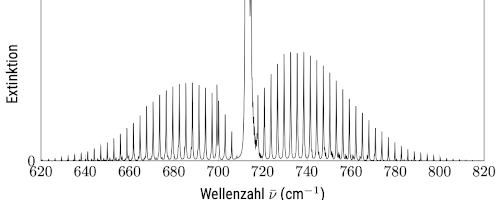
EPC1 Molecular and Solid State Physics 1
This lecture in the 5th semester of the bachelor's program gives in the first 8 weeks an introduction to molecular physics, in particular to the spectroscopy of the fundamental excitations of molecules (rotation, vibration, electronic excitation). In the last third, crystal lattices, phonons and their dispersion are introduced.Read more...
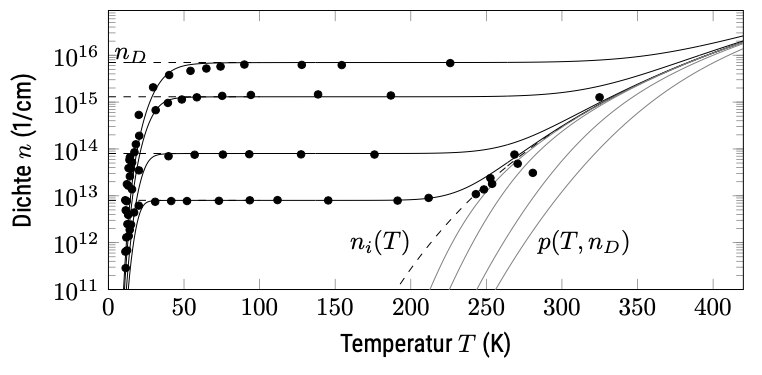
EPC2 Solid State Physics 2
This is the last lecture in the experimental physics cycle of the bachelor program. It deals mainly with electronic properties of solids, such as the conductivity of metals or the band structure of semiconductors. Microscopic models of magnetism and superconductivity are introduced. Read more...
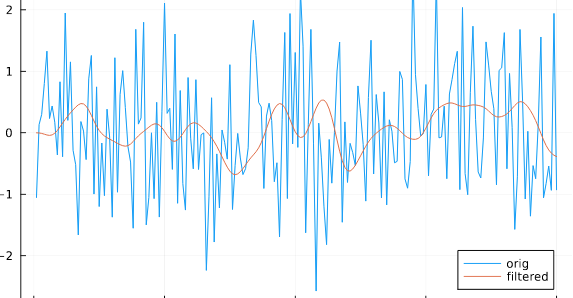
TECA Measurement Methods
The lecture Measurement Methods is an elective course in the bachelor program. It deals with how to measure and what to do with the measured data. The sequence is 'backwards'. We start with statistical data analysis, i.e. the question of which statements can be made on the basis of measured data. The second part deals with the special class of time-dependent signals and the associated linear systems. Finally, in the third part, we apply this to the detection of weak optical signals. Read more...
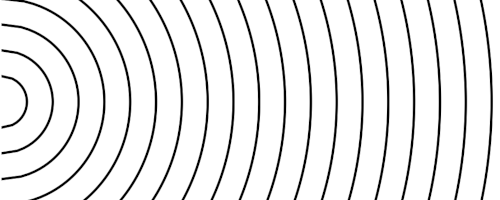
Modern Optics
This lecture provides an introduction to modern optics as an elective in the bachelor program. The propagation of light and its interaction with optical components will be described on different levels: as a beam, as a wave, in Fourier space, as a solution to Maxwell's equations, or as a photon. This will give you the tools to understand, set up and conduct current optical and spectroscopic experiments, which we will also do in practice. Read more...
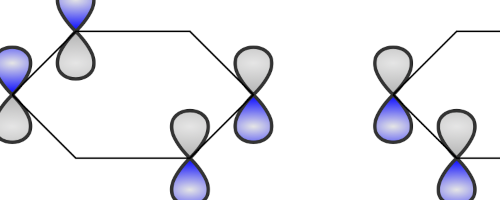
Advanced Experimental Physics: Fourier Transform and Hybridization
In this part of the cross sectional course FEP in the master program, we discuss various applications of the Fourier transform in optics and crystallography. The second topic is the coupling of classical, quantum mechanical and quantum optical systems. Read more...
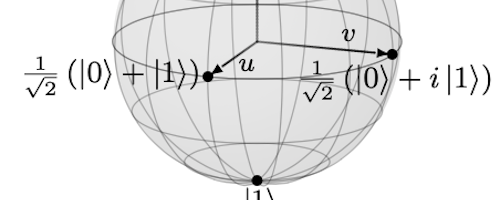
Experiments in Spectroscopy
This is the combined script for the lectures "Spectroscopy of Soft Matter" and "Nanoptics & Plasmonics" in the master program. Each chapter introduces an experiment and then discusses everything necessary to understand the experiment. This will give you a solid overview of various coherent and incoherent, linear and nonlinear spectroscopic techniques as well as basic concepts and ideas of nanooptics. Read more...
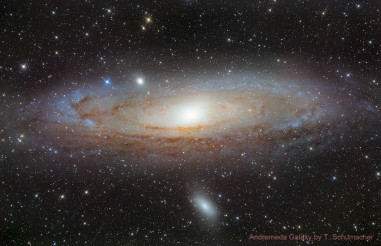
Experimental Astrophysics
This course provides a practical introduction to the fundamentals and experimental techniques of astrophysics. In addition to basic knowledge, we will learn methods of data processing, the use of telescopes and instruments, and finally the analysis of your own recorded data. The aim is to establish as direct a link as possible between what is learnt and its practical application. Read more...
Laboratories
Practical work is of central importance in experimental physics. Therefore, in the labs we supervise, we emphasize that students can (and must) decide freely how to perform an experiment. We try to create situations in which different possible courses of action lead to the goal, rather than having to follow a predetermined recipe.
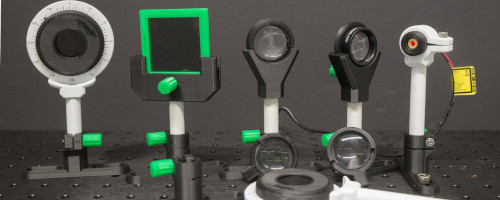
Printed Labs
In particular, practical experiments in optics and spectroscopy are either very far removed from what would be set up in a scientific laboratory. Or the components are expensive and complicated. With "printed labs" we try to close this gap: By 3D printing optomechanical components and experimental setups, high-quality experiments can be carried out very cost-effectively in practical courses and also in schools. Read more...
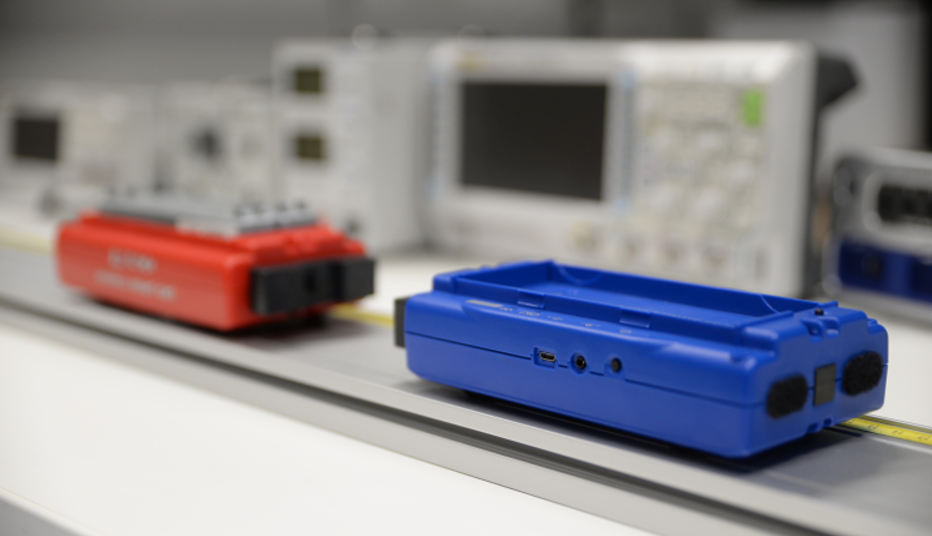
Introductory Physics Lab for teacher education students
Since the summer semester 2019, the Physics Department offers a physics laboratory especially tailored for students of the teaching profession at high school (Gymnasium), secondary school (Realschule) and professional schools (Berufsschule). The focus lies on the one hand on physics concepts, on the other hand on independent planning, setting up and performing experiments. For the latter, in addition to some standard instruments such as oscillographs and function generators, a large number of different sensors are available which can be read out directly via the computer. Read more...
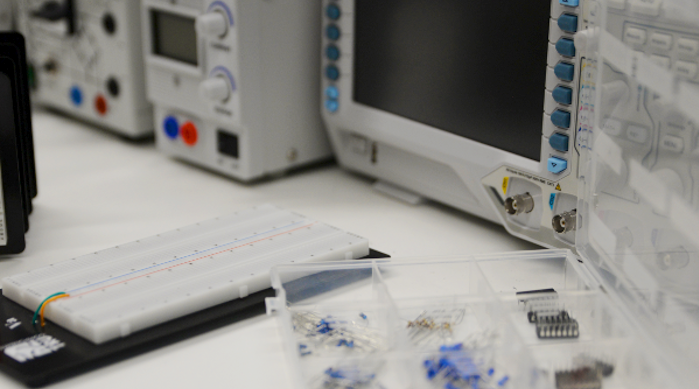
Introductory Physics Lab: Introduction to experimenting
Before working with complex experimental set-ups, the experimental basics must first be created. To this end, experiments in the fields of mechanics, electronics, optics and thermodynamics are planned, set up, carried out and finally analysed independently. In addition to the approach to scientific questions, digital data processing and the use of measuring devices and sensors are also trained. Read more...
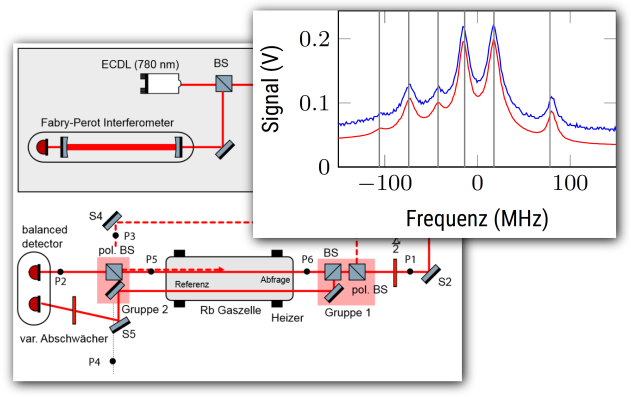
Doppler-free spectroscopy of rubidium
The hyperfine structure is the splitting of electronic energy levels due to the nuclear spin. At fractions of a milli-electronvolt, this splitting is overshadowed by thermal broadening at room temperature. As a result, only the fine structure of atomic spectra can be spectroscoped using conventional methods. In this practical experiment, an optical setup is adjusted and operated which, together with an extremely narrow-band and tunable infrared laser, is capable of resolving the hyperfine structure of various different rubidium isotopes using saturation spectroscopy. manual, github
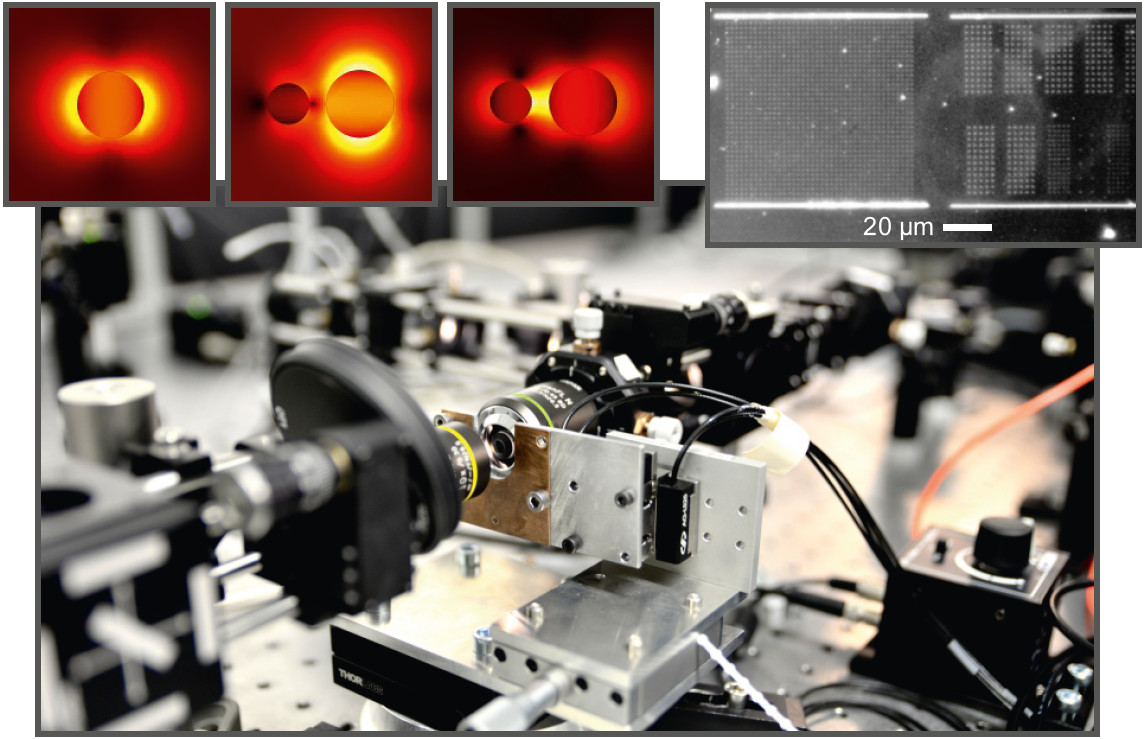
Nanoplasmonics: Resonances in plasmonic rods
In this practical experiment, Master's students independently set up an optical setup and investigate how nanoscopic silver particles absorb light in a special way. The plasmons studied concentrate this light energy in very small areas. This is why they are part of modern research in fields as diverse as biophysics, solar research and quantum technology. The experiment teaches both the practical adjustment of a dark-field microscope and the theoretical description of particle plasmons.

